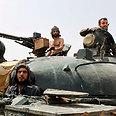
Syrian rebels flock to Cairo
Syria's opposition activists find safety in Egypt, use media to battle Assad's forces, propaganda
“We have to work hard to reach the Syrian audience,” Ahmad, a former engineering student, tells The Media Line. Most Syrians and Egyptians interviewed for the story refused to give their last names.
Related stories:
- Egypt to reevaluate Syria ties after coup
- Egypt army: We didn't kill kids, images taken from Syria war
- Syrian refugees in Lebanon face suspicion
Syrian political groups, activists, and journalists have descended on Cairo since the start of the Syrian revolution in 2011, turning the political capital of the Arab world into a bustling opposition hub where they decide everything from aid shipments for local refugees to arms deliveries to rebels on the front lines in Damascus.
In a tightly controlled state like Syria, few people traditionally challenged the government propaganda. But with the country in the midst of a civil war, the opposition is working to change that. It is trying to alter deeply ingrained beliefs that depict the regime as the protector of Arabism against an onslaught of Western Zionism.
“People had no reason to doubt the regime,” says Ahmad, as he lights a Marlboro cigarette and puts his soot-stained sneakers up on a production table stacked with video tapes.
Syria Tomorrow’s programs highlight the regime’s shelling of civilian areas. It interviews refugees displaced from their homes in camps along the Jordanian and Turkish borders. Syria Tomorrow also features interviews with rebel fighters from the Free Syrian Army (FSA).
In a spacious office off of Tahrir Square where millions gathered to call for the fall of the Egyptian regime in 2011, an Egyptian trainer is lecturing Syrian activists, instructing them in the art of social media.
“We want to reach the young population and get them into the streets,” Faris, one of the Syria activists trying to grasp the outreach techniques tells The Media Line. “It is the youth who are the key to this revolution.”
Behind him the Egyptian instructor is scribbling on a large art pad. Several boxes are connected with long blue arrows indicating how various activists link to one another using different social media.
“It is a challenge teaching these men,” explains the instructor. “They just don’t have the skills our youth do. Syria is very closed. They had no movements like we did before our revolution. We are starting at square zero.”
In a non-descript office in a middle class Cairo neighborhood, Umar is registering names in a thick green ledger book. Marwan and his family of six have just arrived from the Syrian city of Deir al-Zour, where fighting has flared for months. His three year old daughter is restless and asks her father for a cookie. Umar motions to an aide who brings in butter cookies and shiny blue Pepsi cans. The girl gulps down the sweet soda as Umar finishes with her father.
Umar’s organization records the arrival of Syrian refugees in Egypt. According to the latest United Nations statistics, there are 99,167 Syrians in Egypt. “At the beginning they went to Turkey and Jordan,” he explains to The Media Line. But many did not want to live in humiliating conditions in camps.” His organization circulates messages via Facebook and sends out text messages to refugees. Once in Cairo, wealthy Egyptian businessmen put them up in apartments on the outskirts of Cairo.
As the sun sets on another humid July day, 45 Syrian families gather in the Cairo suburb of Giza to break the fast observed by Muslims from sunrise to sunset during the month of Ramadan. Syrian students have reached out to their Egyptian counterparts to help organize fasts throughout the capital. Every day for the past week Syrians chased from their villages and small cities have assembled in the largest Eurasian metropolis to celebrate what was a quiet event back home. Here, drivers speed around bends at high speeds honking incessantly to make it to their homes for the sunset meal.
“Egypt is very different from Syria and I can’t cope with it,” complains 44 year old Muhammad Shami, from the hamlet of Kafr Buhum outside Hama. The people here have totally different moods and behaviors. We are struggling to adapt.”
Adapting to a new country has proven to be a challenge for the refugees. With little money, they have been forced to rely on handouts.
“We are learning to rely on others,” explains 38 year old Muhammad Salum from the city of Hama. “We just want to go home.”
But as the battle in their homeland has reached a stalemate, that does not seem likely anytime soon.
Article by Michel Stors
Reprinted with permission from The Media Line
- Receive Ynetnews updates directly to your desktop










